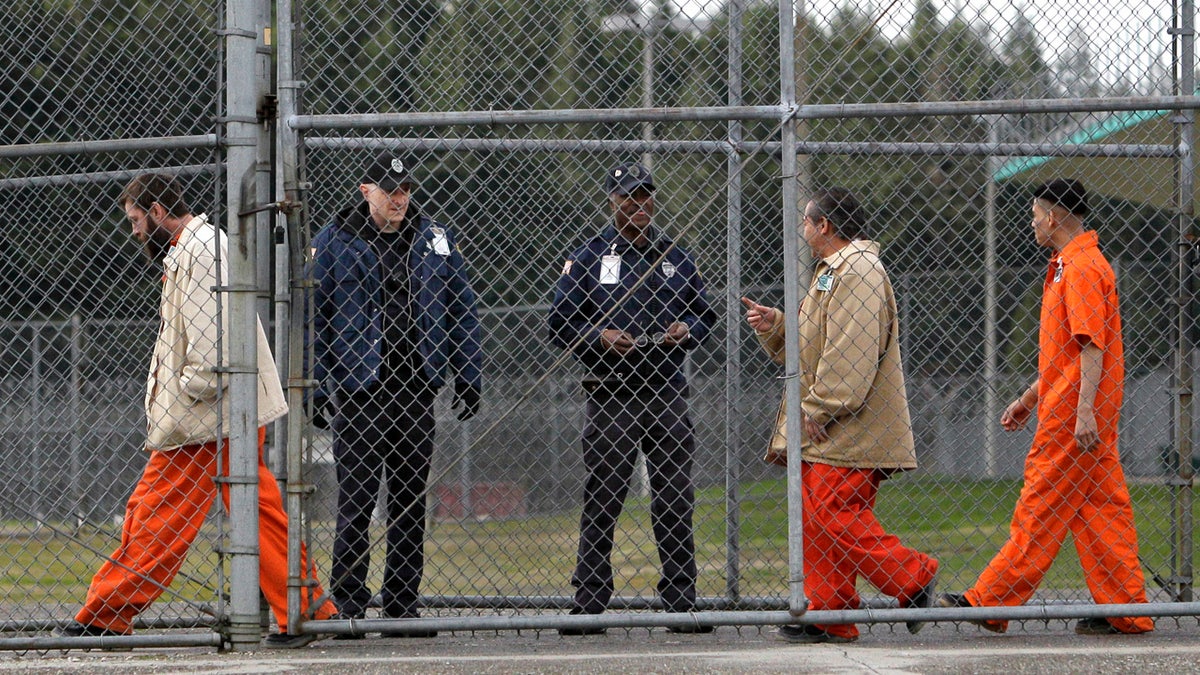
FILE - In this Feb. 17, 2011 file photo, inmates walk past correctional officers at the Washington Corrections Center in Shelton, Wash. Gov. Jay Inslee said Tuesday, Dec. 22, 2015 that more than 3,000 prisoners in Washington have been mistakenly released early since 2002 because of an error by the state's Department of Corrections. (AP Photo/Elaine Thompson, file)
One Easter weekend, I accompanied my father, Charles Colson, to a prison in South Carolina. We held a worship service on Death Row, and about 20 men came out of their cells to sing songs and listen to my dad give a message about the resurrection of Jesus.
My father, whose books on Christian life and thought have sold more than 5 million copies, could have spent Easter weekend in more influential pulpits. He could have commanded an audience of thousands of Christians who were well-resourced and well-connected, rather than men in prison jumpsuits. But instead, every Easter for decades following his release from prison in 1975 for a Watergate-related crime until his death in 2012, he chose to go back behind bars to celebrate with the incarcerated.
My father understood that if we want to change the world, we must start behind bars.
The criminal justice system may not seem like the place to initiate cultural renewal, but no place could be better.
When our nation’s 2.2 million prisoners are held in conditions that do little to help address the roots of criminal behavior, they remain likely to continue in a criminal lifestyle after they are released.
Prisoners might seem like improbable standard bearers for cultural transformation, but my dad believed wholeheartedly that whenever prisoners are transformed, they will transform the culture of their prisons and society at large.
Of the more than 600,000 prisoners who are released each year, two-thirds will be re-arrested within three years. When their parents come home from prison stuck in the same criminal behaviors, the one in 28 American children with an incarcerated parent continue to suffer. New victims are created. Communities remain stuck in cycles of crime, incarceration and poverty.
There is a better way.
Prison officials, departments of corrections, faith groups and other organizations can work together to create a more restorative prison culture—one that offers the perpetrators of crime an opportunity to face proportional accountability for their actions, make amends and prepare to be good citizens and good neighbors upon their release.
For example, Prison Fellowship’s Warden Exchange convenes corrections professionals who exchange innovative ideas and best practices for the moral rehabilitation of prisoners. These practices create correctional environments that respect human dignity, improve safety and reduce the likelihood that released prisoners will commit new offenses.
Prisons are full of untapped potential. Under the right conditions, many people—like my father—can pay their debt to society, prepare for a new future and make the most of their second chance.
A variety of prison programs that address the roots of criminal behavior through education, mentoring, substance-abuse treatment and more have been shown to reduce recidivism.
Legislation based on restorative values can support this goal. The Sentencing Reform and Corrections Act, now making its way through Congress, would require the Federal Bureau of Prisons to implement and incentivize programming to reduce rates of re-offense.
This is good news not just for prisoners but for everyone affected by crime and incarceration. When recidivism rates go down, more children grow up seeing their parents outside of a prison waiting room. There are fewer victims. Communities have a chance to flourish as they benefit from the contributions of members who are successfully reintegrating.
At the first Easter, mourners gathered at the tomb of a man who had been executed with criminals. There seemed to be no future for his followers, a small group of poorly educated misfits with no worldly power or influence. And yet, the nascent Christian movement transformed the culture of the Roman Empire and the entire modern history of the world.
When my dad spent “Resurrection Sunday” behind bars with prisoners, including those condemned to die, he often invoked that first Easter, where the hope of the Gospel emerged from a sealed tomb that was supposed to be as secure as any prison.
Prisoners might seem like improbable standard bearers for cultural transformation, but my dad believed wholeheartedly that whenever prisoners are transformed, they will transform the culture of their prisons and society at large.
Many people have already emerged from correctional environments to make significant contributions to society.
My father founded the nation’s largest ministry to prisoners, former prisoners, and their families after pleading guilty to obstruction of justice.
A woman who was once featured on the FBI’s Ten Most Wanted List founded Angel Tree, the Prison Fellowship program that has brightened Christmas for millions of children.
Meanwhile, our organization's senior vice president of advocacy, who fights every day for a more restorative criminal justice system, is a recovering alcoholic with an arrest record.
Many more people with a conviction in their past have great contributions still to make in the future. A more constructive prison culture can help give them a chance to improve their communities and our country.
As Easter reminds us, the change the world most needs sometimes comes from unexpected places.








































